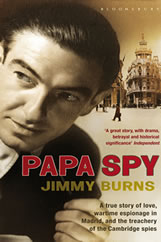Today’s FT includes a thought-provoking and beautifully restrained piece by my former colleague Charles Clover who was expelled from Libya at the weekend and is now back in his Moscow bureau.
Apart from being a thoroughly nice human being, Charles is an experienced journalist who has reported with excellence on other hot spots of the Middle East. But he knew he was taking a professional risk by writing a very personal eyewitness account of the incident that led to his expulsion.
Charles was breakfasting in his Tripoli hotel and meditating on the surreal coverage he and other journalists had been complicit in-every move monitored and controlled by Gaddafi’s thought police with pro-government demonstrations and allied bombing ‘atrocities’ cynically orchestrated to serve the Libyan leader’s propaganda. Then in came a woman pointing at her thighs and screaming that she had been raped repeatedly by a group of Gaddafi loyalists.
Rather than permit an impromptu press conference during which the assorted media could have made their minds up whether the woman was genuine or out of her mind or a combination of both, hotel catering and security staff turned into a heavy mob. The ensuing brawl had one journalist being punched, and Charles himself thrown to the floor and kicked before he issued a formal complaint to the hotel management.
Now safely out of the country, Charles suggests that Gaddafi’s men scored an own goal by deciding to not only rape the woman but then stop her from telling her story in front of a crowd of journalists in a way that had the story magnified in headlines around the world. But his conscience pricks at the thought that the only person to really come out losing was the woman herself, bundled away to an uncertain fate, once the journalists had given up physically fighting on her behalf.
The story of course gets us no nearer to shedding light on the supporters and leaderships of the anti-Gaddafi rebels that NATO and Qatar has geared up to help. But this is a worthwhile read by a journalist who is sensitive and intelligent enough not to completely put himself at the heart of the story. It tells us a thing or two about the real dilemmas facing correspondents in time of war when the first casualty is truth.

